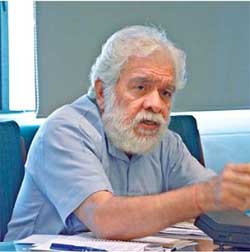Prof. Chand Kiran Saluja
Designation: Director of Sanskrit Promotion Foundation
The Right Perspective of Providing School Experiences and the Present Scenario of Teaching-learning Proces
Teaching philosophy: Try to give students all of your knowledge so that knowledge can grow and expand to an extent where novelties can bloom and be implemented to exercise them for bridging up the loopholes which exist in our societies today.
Gitarattan Institute of Advanced Studies and Training, Rohini organized aNational Conference on The Right Perspective of Providing School Experiences and the Present Scenario of Teaching-learning Process on a virtual platform on 1st October 2021.
The Lead speakers for the conference were Prof. Dhananjay Joshi (Dean and Prof., USE, GGSIPU), Dr S. K. Bhatia (former Associate Prof. C.I.E, DU) and Prof. Chand KiranSaluja (Director of Sanskrit Promotion Foundation). The conference was composed ofseven presenters from varied well-reputed institutions and was divided into twotechnical sessions.
Prof. Dhananjay Joshi started the discussion by addressing how the education system demands to change from time to time. The COVID-19 has changed the education systemdramatically with the teaching-learning process through digital platforms like Google Meet,Zoom, WebEx etc. This pandemic has been challenging for teachers as well as students, all overthe world due to the reasons like lack of digitalized classrooms, their training and techniques, lack of resources, mainly- uninterrupted internet and gadgets and a total shift from offline toonline classrooms. The School Internship Programmes have also suffered due to theseissues as a child understands only 20% of the content given in the book and remaining 80%, heunderstands through the teaching skills and the body language which could be only possible inphysical classrooms. Professor explained the nine components of teaching-learning given by UNESCObriefly and highlighted the fact that even during the pandemic, technology has proven itself to be ablessing in the education sector. The student-teachers are able to complete their internshipprogrammes through simulated learning in an online environment. It is not only building thetech-savvy teachers but also encouraging blended learning in classrooms. Blended learning is not only increasing the flexibility among teachers and learners but also being more engaging,effective and experiential for students.
This was followed by first Technical Session which was hosted by Dr. S.K. Bhatia. He discussed that teachers should encourage experiential learning rather than traditional methodsof learning. He also highlighted Kolb's experiential learning theory which states how learning bydoing is a continuous process where the student acquires knowledge from each new experience.It is a holistic approach as it emphasizes on how experiences including cognition, environment,past, emotions influence learning. The National Education Policy also aims to address thecontinuous and holistic approaches to learning.
There were three paper presentations in first technical session. Ms. Savita Sharma (Assistant Professor, Manav Rachna University, Haryana), Ms. Sonal Aggarwal (Assistant Professor Navyug Mahavidyalaya, U.P.) and Dr. Jyoti Tiwari (Army Institute of Education, U.P.) presented their studies on different topics like 'Making Sense of Virtual SchoolInternship Program: A Case Study of Inter-Institutional Collaboration', 'Traditional Classrooms to Online Modes' and 'The Understanding of Action Research Topic in the Teaching of Social Science Subject of B.Ed Students'. After this, the platform was open for discussion for participants and audiences.
Prof. Chand Kiran Saluja addressed the Technical Session II of theNational Conference. He discussed the National Policy on Education, 2020 and gave an insightinto the present scenario of promoting quality education, rich talents and resources, life-long learning opportunities and the various aims behind the NPE. He also emphasized on the concept of experiential learning and how the purpose of teaching is not limited to what to learn but how to learn. In experiential learning, theteaching-learning process would become more interactive, encouraging, creative, innovative,collaborative, and fun. This is why NPE 2020 has focused on theexperiential, holistic, integrated, inquiry-driven, learner-centred, discussion-based, and flexibleteaching-learning approaches.
Experiential learning can be promoted through the past incidents of the students, adopting a practical approach, problem-solving practices and applying scientific methods in the classrooms. Prof. Chand Kiran canvassed that a child is not a tabula rasa, in fact, he enters into the classroom with his thoughts, feelings, habits, creativity, strengths, weaknesses, languages, andquestions of experiences. Therefore, to promote experiential learning we should adopt theconstructivist approach as mentioned in the National Curriculum Framework, 2005. The teachersshould also encourage curiosity among students to learn new things. Teachers who encouragecuriosity in their students will know that they made an impact that will last a lifetime.
Dr.ShikhaRanjan, following this called for an open discussion on Technical Session 2. There were four paper presentations including Ms. Bhawna Sharma (Assistant prof., Bhavan Leelawati Munshi College, Delhi), Ms. Neha Madan and Ms. Arti Bhatnagar (Assistant Prof. Guru Ram Das College of Education, Delhi)discussed their paper 'Reflection on Online Vs Offline Teaching-Learning Process' and the main theme of the conference. The discussion was concluded by Prof. Chand Kiran as gave advice on self-learning and the importance of language.
The National Conference addressed the present issues which are faced by the student-teachers intheir School Experiences Program. The different ideas were discussed to cope up with e-learningand to promote experiential learning in the teaching-learning process. It was a wonderfulexperience to listen to the opinions of such highly educated and reputed speakers andinstitutional researchers. The entire session came to its conclusion with Dr. Sonia Jindal expressing her appreciation towards all the participants and presenters for the informative session and highlighting the importance of the topic of the session. Dr. Aanchal Rana put forward her heartfelt gratitude in the vote of thanks bringing the session to an end.




